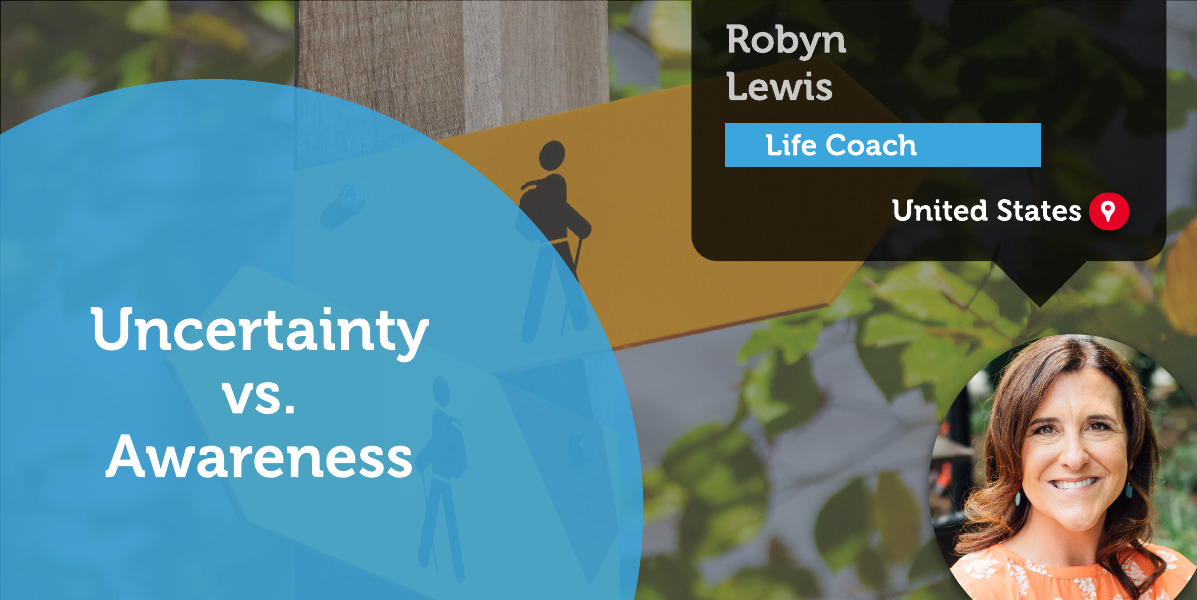A Coaching Power Tool By Robyn Lewis, Life Coach, UNITED STATES

One of the marvels of the world: The sight of a soul sitting in prison with the key in its hand. Rumi

A conviction is a firmly held belief or opinion. Sometimes our convictions can act as great catalysts for positive action or change but in some cases, these internal belief systems can become clouded or distorted by uncertainty. This uncertainty can block us from acknowledging what we do know and lock us in self-imposed prisons making it feel impossible to move forward.
The act of acknowledging what we know to be true can be a powerful tool in creating awareness. If we examine the feeling of uncertainty and its power to cloud situations, we can also look at the very act of becoming aware as the force that brings clarity to those same situations.
When we can counteract uncertainty by creating an awareness of what is known it presents a greater chance to move forward.
Uncertainty vs. Awareness Explanation
Awareness is the ability to realize or perceive that something – a feeling, a situation, a thing – is present. Creating awareness can help to shed light on situations where our mindset has become clouded by uncertainty or assumption. Once such awareness is unlocked or created, it can be utilized to shift perspective and potentially “unstick” us from where uncertainty had once kept us firmly planted.
At times, uncertainty can perpetuate a cycle of negative assumptions leading to self-doubt and the feeling of being “stuck” or “locked” in place. It can wreak havoc on our ability to make decisions and either significantly delay or altogether block us from taking action.
So, what is it that causes uncertainty and keeps us feeling stuck? After all, it is not uncommon to allow negative assumptions to take a larger role in preventing us from moving forward. It may be useful to explore some common negative assumptions that feed into the loop of uncertainty.
Negative assumptions may be based on things such as fear, experience, a perceived lack of knowledge, and a multitude of other factors. Riding on this cycle of assumption or living in this self-imposed prison, without pausing to rethink, may reinforce uncertainty and stagnate our ability to ask powerful questions that could give way to clarity and awareness.
Fear can cause us to overthink and assign more significance or likelihood to a worst-case scenario. It can leave us more susceptible to overreaction and make it difficult to separate from emotions.
Experience can sometimes be fantasized to both extremes. Things either went horribly wrong or they went absolutely perfect! When previous outcomes to similar situations or decisions did not go the way we had hoped there is a tendency to carry that residual uncertainty forward and apply it to future circumstances. That recall effect can bring negative bias along and paralyze the ability to reevaluate.
A perceived lack of knowledge is the staple crutch for many of us, recognized widely as the popular phrase “I don’t know,” when mulling over decisions or situations. The reinforcement of “I don’t know,” may actually cause us to develop misperceptions about how we see the situation or how we see ourselves responding to the situation.
Recognizing Uncertainty
Uncertainty can be based on many things and can manifest in several ways. Often it can keep us feeling stuck because our desire for certainty or security is greater. Focusing on what we do not know, or assuming answers to what we do not know, may lock us in a “stuck state” and impede our ability to visualize, create and execute a meaningful action plan.
Managing Perspective in Uncertainty vs. Awareness
Unless you have a crystal ball, it is unlikely to eliminate the uncertainty. Creating awareness, however, can shift the client’s perspective from unclear or negative assumptions to recognizing the power of what is known. Even more powerful is the ability to take what is known through such awareness and applying it to forward progress.
Creating Awareness
Supporting a client through powerful questioning can lead to a shift in perspective and unlocking awareness.
The actual process of decision making, evaluating a situation, or exploring a feeling, may involve identifying and evaluating options and exploring how each one of those options may or may not support the desired outcome of the client. Through this process, the client is focused on gathering knowledge, rather than stewing in the uncertainty keeping them stuck.
Pausing the negative assumption cycle long enough to ask, “What do you know?” can allow for discoveries, unlocking and revealing certainties that are present. Uncertainties can cause blind spots in how the client views themselves or a situation. These blind spots can prevent the ability to see or think clearly. Shifting the questioning to ask the client what they can acknowledge also shifts their perspective. It is at that moment when the client acknowledges what they do know that unlocking awareness begins…therefore recognizing how such awareness may serve them in bringing forth meaningful action to move past the uncertainty and creating a plan to do so.